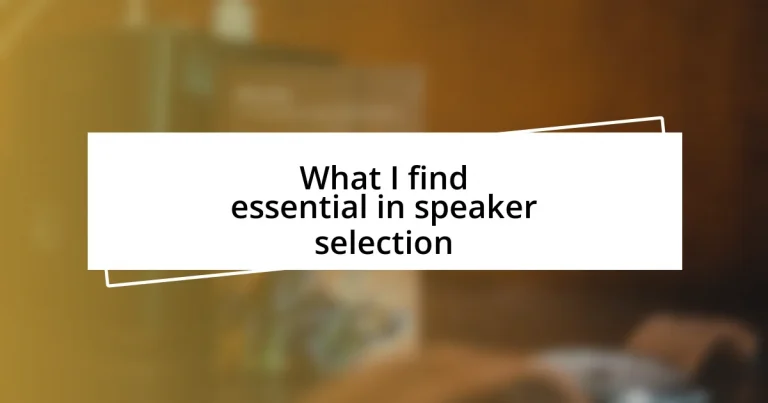Key takeaways:
- Understanding the audience’s needs and emotions is crucial for selecting the right speaker, as it fosters connection and engagement.
- Key qualities of effective speakers include authenticity, adaptability, and strong storytelling skills, which enhance audience memorability and interest.
- Conduct thorough audience analysis based on demographics, interests, cultural context, and past experiences to ensure speaker alignment with the audience’s expectations.
- Effective communication and detailed confirmations with speakers help avoid logistical issues and misaligned expectations before an event.
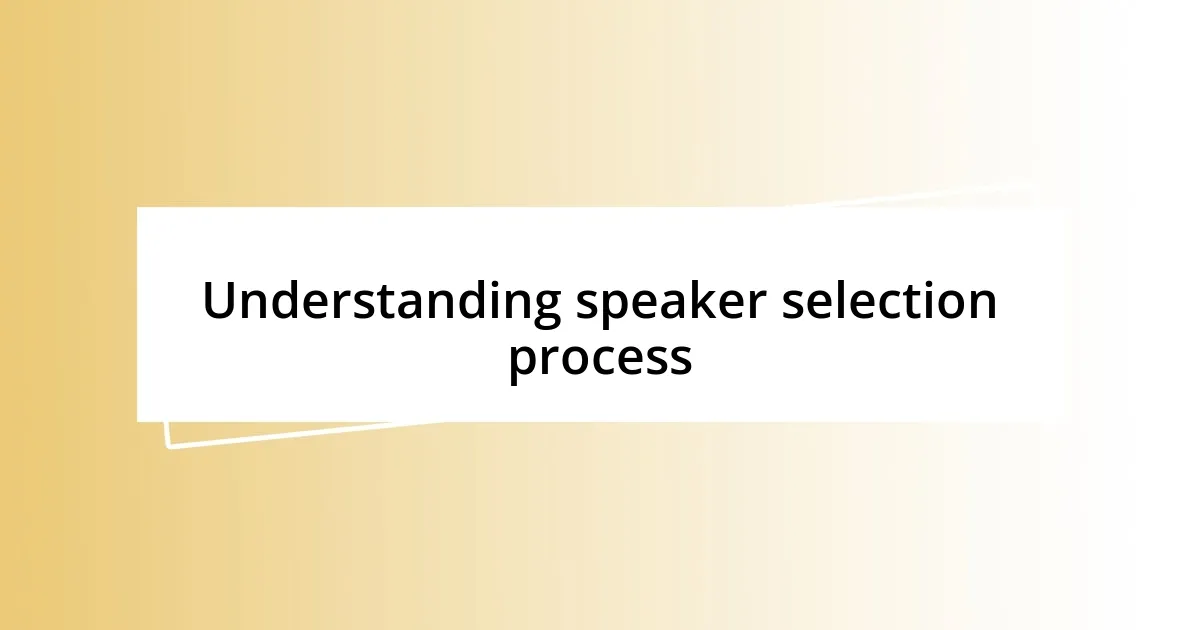
Understanding speaker selection process
When I think about the speaker selection process, I can’t help but recall a time when I was part of a committee choosing a keynote speaker for an industry conference. We were overwhelmed with choices, but it really came down to one crucial question: who could connect with our audience? I’ve learned that understanding the needs of your specific audience is the first step in identifying the right speaker.
It’s fascinating how emotions play a role in this decision. I remember the palpable excitement in the room when we found a speaker whose story resonated with our theme. Their ability to share personal experiences that struck a chord with attendees can create an unforgettable atmosphere. So, ask yourself: what will make your audience feel inspired and engaged?
As you navigate through this selection, it’s essential to clarify the purpose of your event. Reflecting on past experiences, I’ve found that aligning the speaker’s expertise with the event’s goals makes all the difference. Without this alignment, the energy can fall flat, and that’s something I definitely want to avoid.
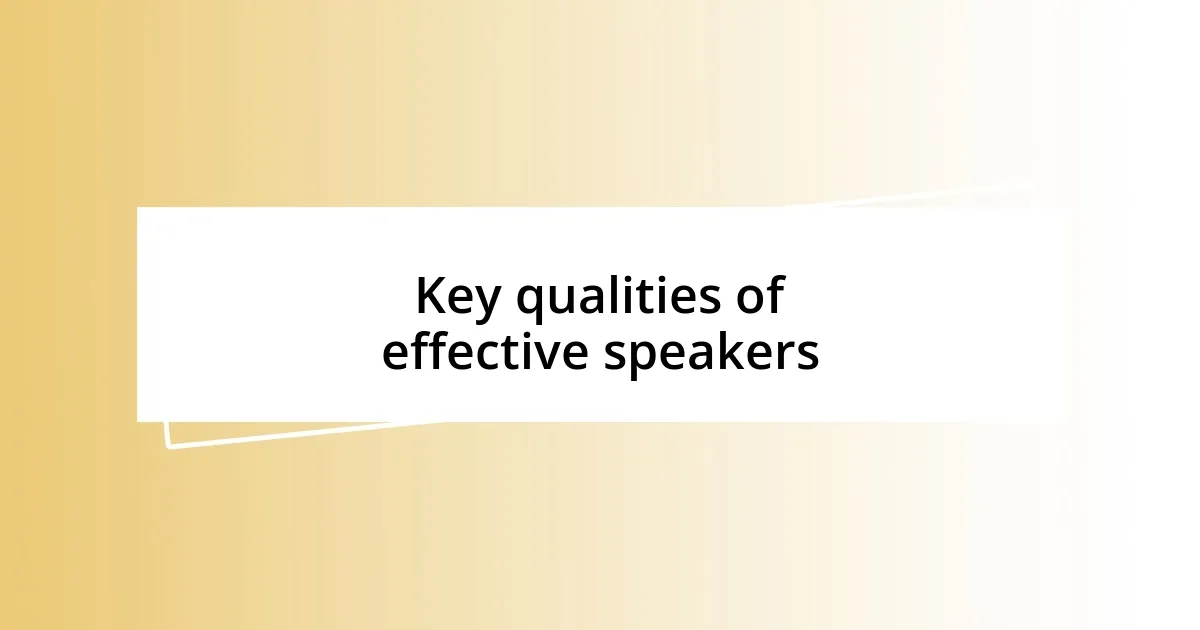
Key qualities of effective speakers
When I think about effective speakers, one key quality stands out: authenticity. I recall attending a seminar where the speaker shared genuine stories of struggle and triumph. Their sincerity instantly built trust with the audience, and I couldn’t help but feel a connection. This experience taught me that when speakers are authentic, they engage their audience on a deeper level, making the message more memorable.
Another crucial quality is adaptability. I once witnessed a speaker who effortlessly adjusted their presentation mid-way through due to unexpected audience reactions. They read the room, shifting topics and tones to align with our energy. This adaptability kept us engaged and showed me how essential it is for a speaker to be flexible and responsive.
Finally, effective speakers possess strong storytelling skills. In a recent workshop, a speaker captivated the audience by weaving personal anecdotes into their message. This storytelling not only illustrated key points but also evoked emotions that resonated with everyone present. I believe this ability to connect through stories is what transforms a good presentation into an unforgettable experience.
| Quality | Description |
|---|---|
| Authenticity | Genuine and honest communication that fosters trust and connection. |
| Adaptability | Ability to adjust and respond to audience feedback and energy during the presentation. |
| Storytelling | Using personal anecdotes to engage the audience emotionally and illustrate key messages. |
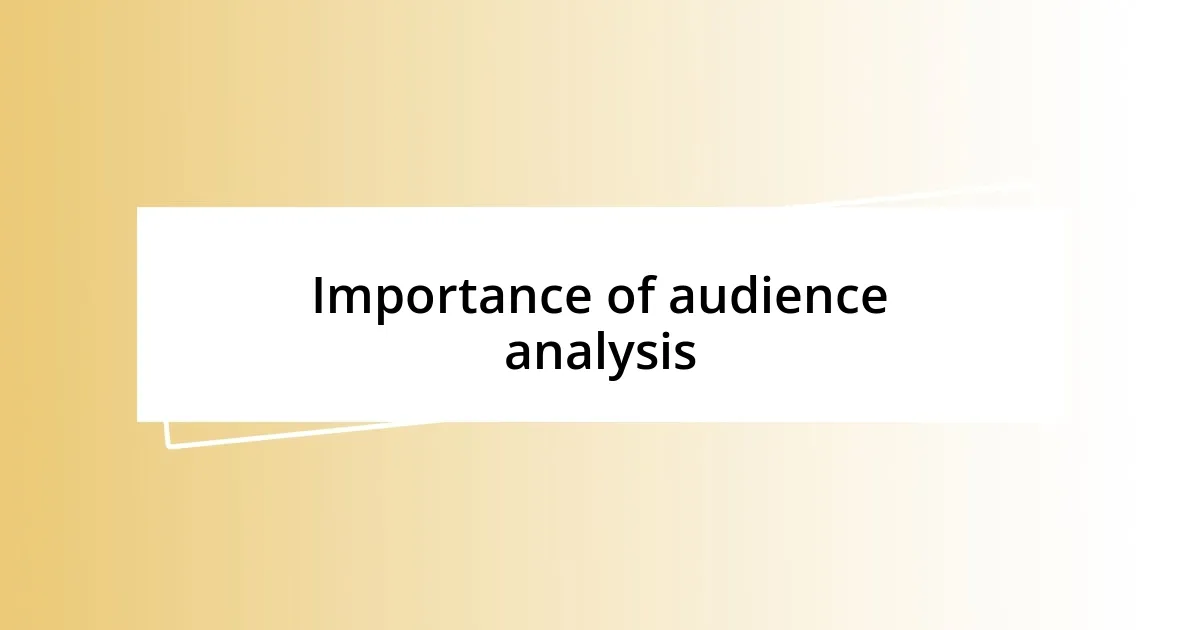
Importance of audience analysis
Understanding your audience begins with careful analysis. I can’t stress enough how pivotal this step is in speaker selection. I remember a time when we mistakenly booked a speaker who was talented but misaligned with our audience’s interests. The disconnect became painfully evident during their presentation. That experience deeply underscored for me that the most engaging speaker is one who understands the audience’s unique preferences, values, and aspirations.
To effectively analyze your audience, consider these crucial points:
- Demographics: Know the age, gender, and background of your audience. This helps in tailoring the message appropriately.
- Interests and Expectations: Understand what your audience hopes to gain from the event. Are they looking for inspiration, education, or simply entertainment?
- Cultural Context: Be aware of cultural sensitivities within your audience. This helps avoid potentially awkward or offensive moments.
- Previous Experiences: Reflect on past events similar to yours. Consider feedback on speakers who resonated well and what specific aspects of their presentations connected.
By putting in the effort to analyze your audience, you’re setting the stage for a successful event filled with meaningful engagement. The right speaker not only brings expertise but also a relatable approach that resonates with those attending.
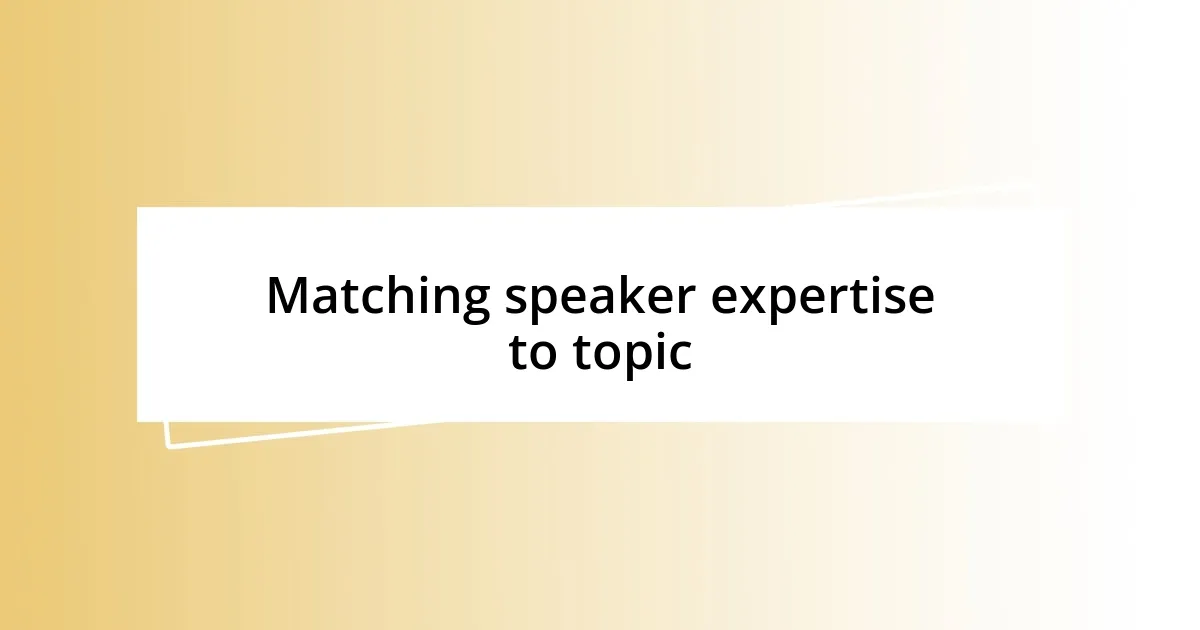
Matching speaker expertise to topic
Matching a speaker’s expertise to the topic at hand is absolutely critical. I once attended a conference where the keynote speaker was a renowned scientist. While their credentials were impressive, they spoke on a topic that was completely outside their field of expertise—coaching and leadership. As a result, I felt a disconnect; it was clear they were out of their depth, and it left me wondering if the organizers had truly considered the alignment of expertise and subject matter.
I’ve learned that the best experiences arise when speakers have a genuine understanding of their topic. For instance, during a session on digital marketing, the speaker shared firsthand experiences, complete with actionable strategies that I could immediately apply. This authenticity, stemming from their expertise, not only engaged me but also inspired trust in what they were sharing. Doesn’t it make a world of difference when a speaker relates their own journey to the subject matter?
When matching expertise to topic, it’s essential to look beyond credentials. I remember another event where the speaker had years of corporate success but lacked a passion for public speaking. The presentation felt flat, with little energy. I couldn’t help but ask myself: did the organizers prioritize expertise over engagement? Finding the sweet spot where knowledge and passion intersect can elevate an event from mundane to truly impactful.
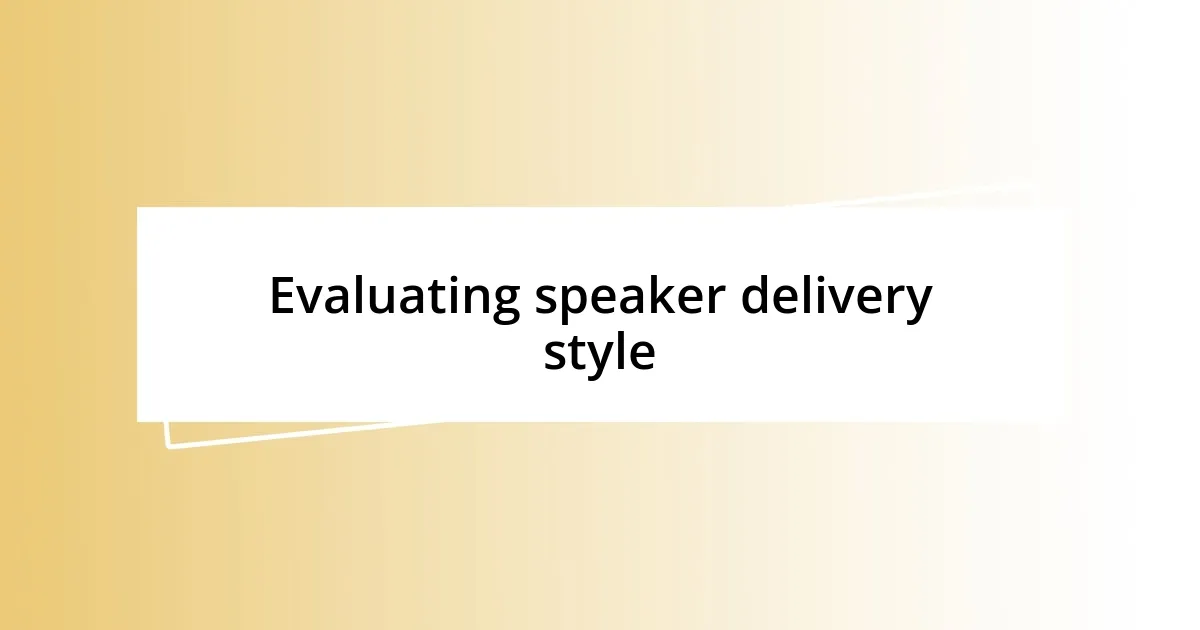
Evaluating speaker delivery style
When evaluating a speaker’s delivery style, I’ve found that energy plays a key role in keeping an audience engaged. I once watched a speaker who had a tremendous command over their subject matter but delivered it in a monotonous way. Despite the incredible information being shared, my attention drifted. It left me contemplating how crucial delivery is, and I realized that a speaker’s passion is what truly captivates the audience’s interest. How can someone inspire if they don’t seem excited about what they’re discussing?
Body language is another essential factor I pay close attention to during presentations. I recall attending a workshop where the speaker used gestures effectively to underline their points. Each movement seemed intentional, reinforcing their message. It wasn’t just the words that resonated; their physical presence added a layer of connection that made the content more memorable. Have you ever noticed how an expressive speaker can make you feel like they’re talking directly to you? That’s the power of effective delivery.
Finally, I believe timing and pacing are vital when it comes to engaging an audience. I once saw a speaker who rushed through their presentation, leaving little room for questions or interaction. The audience seemed overwhelmed, and the genuine dialogue I hoped for never materialized. In contrast, a speaker who thoughtfully paces their delivery allows for reflection, making it easier for the audience to absorb the information. Isn’t it fascinating how the tempo of a presentation can shape its impact?
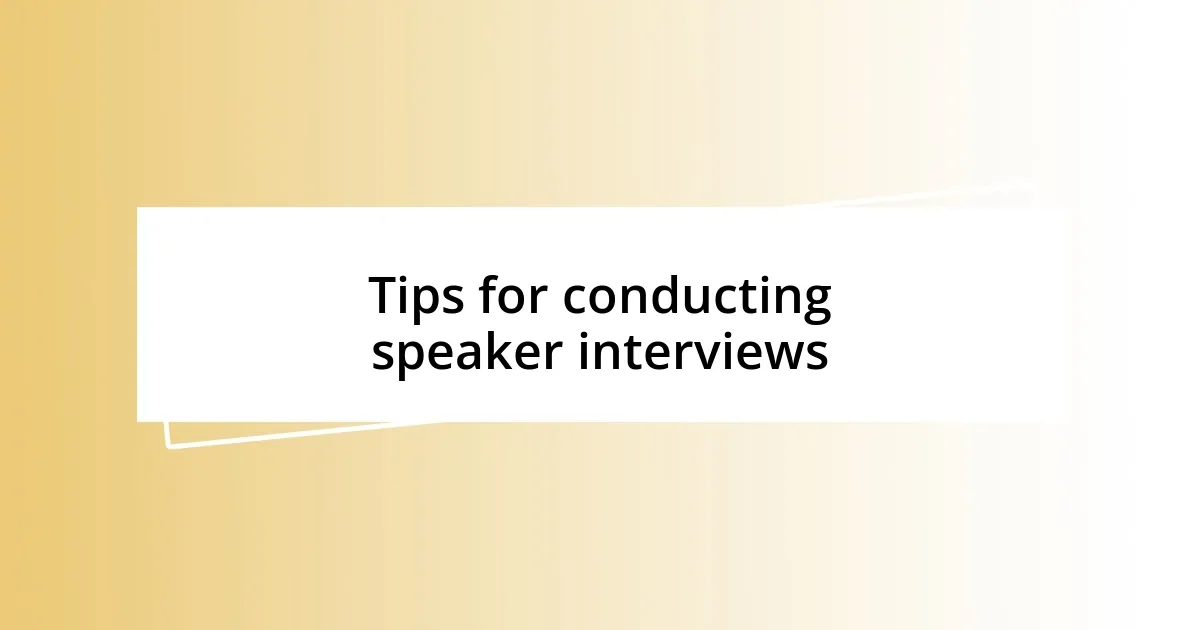
Tips for conducting speaker interviews
When conducting speaker interviews, I always start by creating a relaxed environment. I remember interviewing a potential speaker in a coffee shop, and the informal setting allowed us to connect on a personal level. It transformed what could have been a stiff interview into a genuine conversation, helping me gauge their true passion for the topic. Have you noticed how an informal chat can reveal more than a formal setting?
I find it beneficial to ask open-ended questions during these interviews. Instead of simply checking off a list of qualifications, I want to hear about their experiences and insights related to the subject. One time, I asked a candidate to share a failure they faced in their career. Their candid response not only showcased their vulnerability but also illustrated how they turned challenges into learning opportunities. Those moments of authenticity can set a speaker apart.
Lastly, I suggest listening as much as talking during these interviews. I remember a time when I let the speaker share their vision without interruption. What emerged was a passionate narrative filled with anecdotes that showcased their expertise, and I could truly feel the energy they would bring to a stage. Isn’t it amazing how much more you can learn when you give someone the space to express themselves?
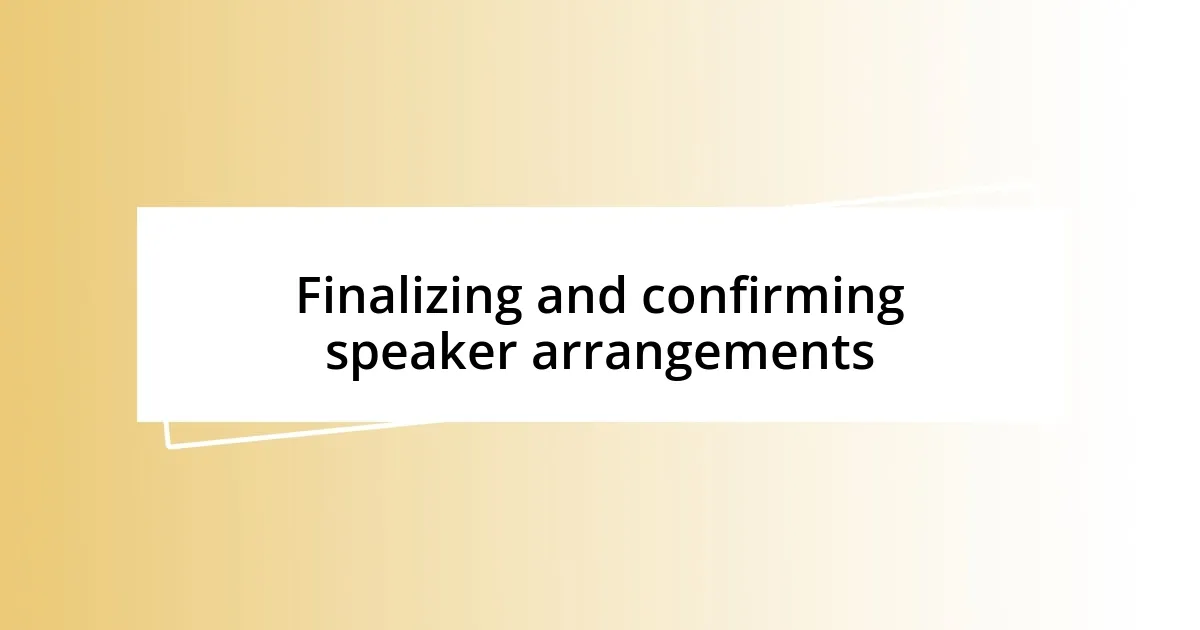
Finalizing and confirming speaker arrangements
When finalizing and confirming speaker arrangements, I make it a point to send a detailed confirmation email. One time, I neglected to include specific logistical details, and it led to confusion on the event day. I remember the speaker arrived late, and it threw the entire schedule off balance. A simple recap of timing, location, and technology needs can save a lot of headaches. Have you ever experienced those moments where one small oversight cascades into a larger issue?
Additionally, I ensure that there is clear communication regarding expectations on both sides. I once had a situation where the speaker and I had different interpretations of the presentation length. During a follow-up chat, I discovered their passion for sharing extensive stories which meant they needed more time. By discussing our expectations openly, we could align on a plan that worked for everyone. Isn’t it reassuring when both parties are on the same page?
Finally, I find a quick check-in closer to the event day invaluable. I typically give a quick call or text, just to touch base and confirm any last-minute details. There was a conference where I reached out a day before and learned that the speaker had a sudden schedule conflict. It allowed us to pivot quickly and find a solution before it became a more significant problem. How do you ensure everything stays on track in your arrangements? Keeping these lines of communication open makes a world of difference.












